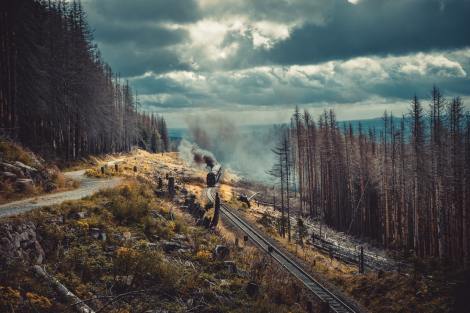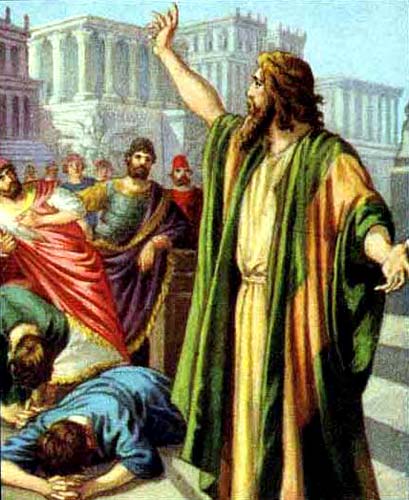
Becoming sidetracked—distracted, pulled off course, diverted—is something we all understand. I mean, how many times do we start one task and in the process see something that pulls our attention away and causes us to start a new task.
Facebook or social media in general is a good place for becoming sidetracked. Yes, we want to click over to read one article, but there’s a link that seems like it will give more information, so we jump over to a different site, then a notification comes which we have to read, which contains an important message we must deal with at once and . . . what were we planning to do at Facebook in the first place?
In some ways the issue is that we are bombarded by information. And options.
Of late, our society has bombarded us all with Problems That Need To Be Fixed. The current two, of course, are the Coronavirus and racism. Before those, we were told—or perhaps taught would be a better word—that the planet was at risk unless we got our act together and stopped using fossil fuel as a source of energy. THAT would solve all the problems.
Except, apparently, racism and Coronavirus.
Along with these issues, we’ve also been taught that we need to stand against sexual abuse in any shape, that women must receive equal pay and opportunities as men, that we should stand against Apartheid, fight a war on poverty, stop bullying, build up a child’s self-esteem so they don’t pick up a gun and try to kill as many of their schoolmates as possible.
I could go on.
The thing is, these causes and campaigns are not all wrong, though some have engendered a bit of controversy. So is the Coronavirus a real problem? Yes, as much as some people would like to say it’s a problem drummed up by government to control the population. Actually, people are getting sick and dying all over the world.
And racism? The very people who say “all ANYBODY are ANYTHING,” are racists. So all police aren’t racist. Nor are all whites. Those are actually racist statements (as is the statement that all BLM supporters are racist). So yes, the problem of racism does exist.
Apartheid was an issue in South Africa, but now it seems to have migrated to America where we have NAME-THE-RACE communities. In other words, we are segregating by choice—at least a number of us are.
And yes, the gender issues are real. Women should not be harassed, raped, abused, misused. Bullying is a real problem—no one should be shamed or coerced or mocked publicly, because of their beliefs, their looks, the way they talk, or think, for their background, or history. Of course mass shootings are a real problem, too, at least in the US. In South America, for decades the issue was bombings. And shootings. I guess the Middle East goes the bombing route. And of course the US has known a few of those, ourselves.
I could go on. The environment? Yes, actually God gave humans “dominion” of the earth—not to misuse it, squeeze all the goodness out of it, as happened during the Industrial Revolution in the West. When people realized that rivers were becoming so polluted they were toxic, that the air was so contaminated it was dangerous, measures began to come into practice to change the damage we had done.
I say “we” as a reference to humans, though none of us were even alive at the time.
But I don’t want to get too far afield from the main topic (although that would actually serve as a good example of what I’m saying). All the problems—and many more that I haven’t even mentioned—are only side issues. They aren’t the real problem.
But as long as we talk about these other problems in the media and with our children and in our schools, as long as we are writing books and signing petitions and participating in protests and pointing fingers about any of these issues, we are being sidetracked.
The real issue—the central issue above all else—is that we as a culture, as many cultures—have turned away from God. We show it by how we treat each other and by how we treat our world, but mostly by how we treat God.
Do we know God? Or do we buy into the “God is dead” rhetoric? Do we exclude Him from our schools? Keep Him locked in the privacy of our own homes rather than include Him as part of the public conversation about all these other issues?
After all, God knows the human heart better than we do. He knows my heart and He knows the heart of the guy in China who just lost his mother to the Coronavirus. He knows the heart of abusive cops and He knows the heart of criminals and He knows the heart of citizens who are just minding their own business.
God is mindful of us. “He knows we are but dust.” Jesus understands our weaknesses, because “He was tempted in all things as we are, yet without sin.” God knows.
Do we turn to Him for answers? Or do we treat Him as an uninvolved spectator?
Do we live to make Him known? To turn the spotlight on Him as the One who deserves all praise and worship and honor?
Or are we focused on getting our lives back to normal?
What’s our mission statement, our assignment from God, and are we focused on accomplishing that or are we sidetracked by, oh, so many things?
Photo by Mark Plötz from Pexels

 The first group of leaders who have turned to the Bible and are addressing today’s circumstances in light of what the Bible says, seem to me to be
The first group of leaders who have turned to the Bible and are addressing today’s circumstances in light of what the Bible says, seem to me to be 


![PowerElementsCharacterDevelopment[1000][1]](https://rebeccaluellamiller.files.wordpress.com/2015/05/powerelementscharacterdevelopment10001.jpg?w=205)







